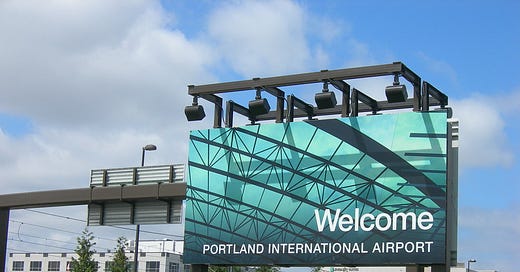Oregon Needs a Foreign Policy
It's time for Oregon to reclaim its reputation for forging ties beyond its shores
Here Oregon sits on the Pacific Rim, eight time zones from Japan, eight time zones from London, poised to be part of the international economy. But we really don’t take advantage of our location. Oregon needs a foreign policy to push for more integration with the larger world.

Trade makes up a sizable portion of Oregon’s economy, but it could be larger. Currently, about 11% of Oregon’s economy is international exports. Recipients of Oregon products (including goods that just pass through the state from one place to a final destination) are led by China and Canada, followed by other Pacific Rim countries (in order: Vietnam, South Korea, Japan, Malaysia, Taiwan, Singapore, and Mexico), Germany, and the rest of the world. Business Oregon, the state’s economic development agency, is set up to help Oregon businesses get into export markets. Our outreach to the global community, though, is focused—arguably too focused—on shipping out of our ports and making air connections with various international markets.
Which sectors are already taking advantage of the state’s unique location? Oregon’s agricultural community is the most international part of our entire state. For decades, the primary markets for wheat, timber, grass seed, berries, and the rest have been not only other states, but the rest of the world. It was Oregon wheat the spurred Japan’s ramen industry in the post–World War II era. Oregon grass seed is often the field of choice for international competitions.
Where’s there a lot of room for improvement? Oregon needs to import capital to really take advantage of the international community’s resources. Finding international investors who will build and grow their companies in Oregon is not the priority it once was.
Historically, Oregon has seriously engaged with the international world when governors make it a priority. The very first American governor to make an overseas trip was in 1959. Oregon governor Mark Hatfield took trips to Japan and Europe in 1964 and 1965, beginning a pattern that has pretty much held—governors make about two international trips during each term.
Vic Atiyeh broke this mold in his second term (1983–87) with nine trips to many east Asian and some Middle Eastern countries. He initially focused on finding export markets for Oregon products. Atiyeh learned that he could help Oregon recover from the deep recessions of the early 1980s by diversifying our economy through finding companies to build in Oregon.
Former governor Ted Kulongoski came to think that Atiyeh “had a better sense of trade and the global economy” than any governor. In his opinion, “all the rest of us [Oregon governors] have actually followed in his footsteps.”
But governors have also gone back to the average of two trips a term.
It is still common for members of Oregon trade delegations to have to explain where Oregon is (between Microsoft and Boeing in Washington and Silicon Valley and Hollywood in California…) as they look for connections out there in the world. Anecdotally, people know about Nike and Columbia Sportwear, but they don’t know they are headquartered in Oregon. We’re not a known quantity. Oregon needs a higher profile.
Oregon ought to have a dedicated foreign policy official. While it is fine for individual industries and businesses to pursue international connections, it would be much more efficient and effective to have the explicit support of state government out there to expand Oregon’s connections to the world. The City of Los Angeles, for example, has a deputy mayor in charge of international relations. Business Oregon does a fine job, but it needs a champion at the highest levels of government.
This is a position the legislature could create; it is also a job the new governor could establish in 2023. Whichever branch it comes from, creating a high-level post to oversee and encourage engagement with the world would go a long way to helping Oregon’s economy keep pace, and it would most likely help us to negotiate the complex world of climate change with more credibility and more ability to cooperate with other major players.
Oregon’s more than the middle of the California-Washington sandwich. The world ought to know that.
Who is Jim Moore? Longtime observer of Oregon and west coast politics. Political analyst for various media outlets, professor at Pacific University.



